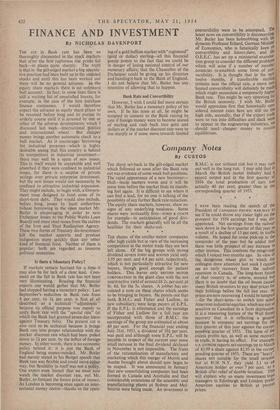FINANCE AND INVESTMENT
By NICHOLAS DAVENPORT THE cut in Bank rate has been so thoroughly discounted in the stock markets that after the first rapturous rise prices fell back—in places quite sharply. The truth is that in the gilt-edged market a big specula- tive position had been built up in the undated stocks and until this has been worked out there will be no general advance. In the equity share markets there is no untoward bull account. In fact, in some lines there is still a waiting list of unsatisfied buyers, for example; in the case of the hire purchase finance companies. I would therefore expect the advance in equity share prices to be resumed before long and to pursue its orderly course until it is arrested by one or other of the adverse developments which I discussed last week—international politics and international wheat. But cheaper money brings another automatic check to a bull market. As it encourages borrowing for industrial purposes—which is highly degirable seeing that this country is behind its competitors in industrial investment— there may well be a spate of new issues. This in itself would be acceptable and well absorbed if they were confined to industrial issues, for there is a surplus of private savings over private enterprise investment, but the new issues would not necessarily be confined to attractive industrial expansion. They might include, to begin with, a Govern- ment issue designed to fund some of its short-term debt. They would also include, before long, issues by local authorities (whose borrowing in the open market Mr. Butler is encouraging in order to save Exchequer issues to the Public Works Loan Board) and more steel issues from the stables of the Iron and Steel Realisation Agency. These two forms of Treasury dis-investment kill the market appetite and produce indigestion more quickly than any other kind of financial food. Neither of them is popular: both are regarded as tiresome political necessities.
Is there a Monetary Policy?
If markets remain hesitant for a time it may also be for lack of a clear lead. Com- ment on the fall in Bank rate has not been very illuminating. Reading the financial experts one would gather that Mr, Butler had stopped having a monetary policy. Last September's reduction in Bank rate from 4 per cent. to 3f per cent. is first of all described as a technical "adjustment " because its official purpose was merely to unify Bank rate with the "special rite" (at which the Bank had granted seven-day loans against Treasury bills). The present cut is also said to be technical because it brings Bank rate into proper relationship with the market discount rate which had been pulled down to 21 per cent. by the influx of foreign money. In other words, there is no economic policy behind it: it is just the Bank of England being money-minded. Mr. Butler had merely stated in his Budget speech that Bank rate was flexible and could move either way, but flexibility in itself was not a policy. One expert even hinted that we must now watch the market discount rate, not Mr. Butler, to forecast the future price of money. As London is becoming once again an inter- national money centre—thanks to the open- ing of a gold bullion market with" registered" (gold or dollar) sterling—all this financial gossip 'points to the fact that we could be in danger of losing national control of our monetary affairs, that the Chancellor of the Exchequer could be giving up his direction and handing it back to the Bank of England. 1 do not believe that Mr. Butler has any • intention of allowing that to happen.
Bank Rate and Convertibility However, I wish I could feel more certain that Mr. Butler has a monetary policy of his own. If he has none at all, he might be tempted to consent to the Bank raising its rate if foreign money were to become scared of sterling and rush back into gold and dollars or if the market discount rate were to rise sharply or if some move towards limited convertibility were to be attempted. TM latest news on convertibility is disconcerting, Mr. Butler has been hobnobbing with the dynamic Professor Erhard, German Minister of Economics, who is fanatically keen on convertibility and laissez-faire, and lh° O.E.E.C. has set up a ministerial examine' tion group to consider the different problena which will arise if a number of member countries re-establish some form of con' vertibility. It is thought that in the nest twelve months, if transferable sterling remains near the official rate, a move into 'limited convertibility will definitely be made which might necessitate a temporarily higher Bank rate. This might be very upsetting for the British economy. _I wish Mr. Butler would appreciate first that historically con' sidered interest rates here are still on the high side, secondly, that if the export trade were to run into difficulties and slack were to appear in the engineering industries, we should need , cheaper money to restore equilibrium.


































 Previous page
Previous page